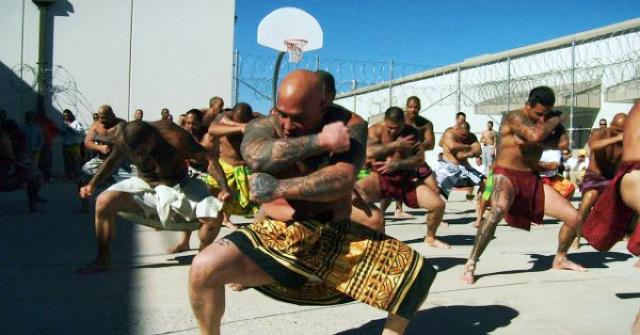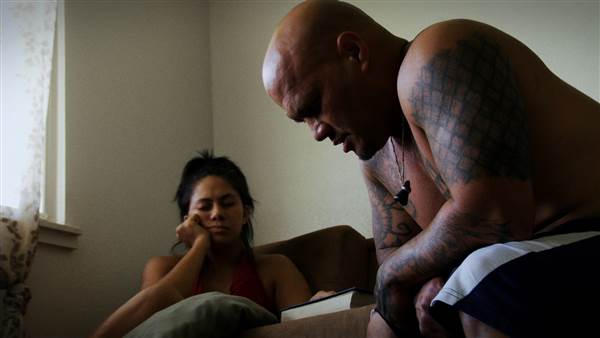 |
Canku Ota
|
 |
|
(Many Paths)
|
||
|
An Online Newsletter
Celebrating Native America
|
||
|
July 2017 - Volume 15
Number 7
|
||
|
|
||
|
Documentary Follows
Inmates Embracing Native Hawaiian Traditions
|
||
|
by Lakshmi Gandhi -
NBC News
|
||
For many of the Native Hawaiian inmates at the the Saguaro Correctional Center in Eloy, Arizona, director Ciara Lacy visited for her new documentary, prison was the first time they were ever exposed to most Hawaiian traditions. "To come to prison without those cultural connections and then to find something in terms of identity in prison, it was really powerful to see," Lacy told NBC News. "I speak Hawaiian, and I am a Native Hawaiian. These are men from my community."
The film, "Out of State," which is scheduled to make its debut at the Los Angeles Film Festival on June 18, largely takes place at the private prison, which was specifically built to house Hawaiian inmates due to the overcrowding of the facilities in their home state, according to the documentary. It was there Lacy met David and Hale, two longtime inmates who are adjusting to life an ocean away from home. "This is not a simple problem. It's shedding a light on a practice that's not uncommon," Lacy said of the concept of sending inmates to other states to serve out their sentences. "It's not uncommon to ship people out of state [due to overcrowding in local prisons.] This is just one of the more extreme examples."
She noted that the practice places enormous financial and emotional burdens on the spouses, children, and other family members the inmates leave behind. "For the family of an inmate, the distance has an indelible impact. The flight to Arizona is roughly six hours, and then there are the additional costs of a hotel room and car rental. It's expensive," she said, adding that many of the Arizona-based inmates told her that they never had any visitors at all. "They really appreciated that somebody from home was able to come out there [and tell their story] and process it," Lacy said. "To know that people from home were interested in their stories was important to them."
Over the course of the film, viewers watch as David, Hale, and the other inmates participate in traditional Native Hawaiian religious ceremonies, learn the language, and form a community with their peers. The connection with indigenous Hawaiian culture the inmates found in prison was particularly remarkable because of the history of the state, which didn't allow the teaching of the Hawaiian language between 1896 and 1978, according to the Hawaii State Department of Education.
"My mother's generation wasn't allowed to speak Hawaiian. Then there were protests in the 1970s to bring the language back, which is how I learned it in school," Lacy said. "Now there are more people learning Hawaiian growing up, but there was a gap in language acquisition because my mother [and other parents] couldn't teach their kids." That gap in cultural knowledge is apparent among the prisoners, who along with their spiritual advisers are actively working to close it. "It's almost viral," Lacy said of the popularity of Hawaiian among the inmates. "They are teaching it to each other, so there is this access to learning to speak Hawaiian in prison."
Lacy added that because the ability to practice one's religion in prison is a civil right, the inmates are guaranteed the time, space, and tools like traditional Hawaiian instruments and access to language textbooks that they need. Additionally, cultural advisers like the late Kaiana Haili would regularly visit the inmates to instruct them and provide guidance. "These guys are just so connected," Lacy said. "They have the greatest bond." But despite the spiritual support many of the prisoners receive in Arizona, reintegrating back into society after returning to Hawaii remains a challenge. As a result, many of the newly-returned former inmates struggle with finding housing and employment, while at the same time working to reestablish relationships with their children and partners, according to Lacy. "For a lot of the men, getting out is an adjustment," Lacy said. "You're trying to repair your relationships with your friends and family. You're trying to find a job. And it's very difficult to prepare for this in advance, when you're so far away." |
|||||||||||
|
|
|
|
||
|
|
||
| Canku Ota is a free Newsletter celebrating Native America, its traditions and accomplishments . We do not provide subscriber or visitor names to anyone. Some articles presented in Canku Ota may contain copyright material. We have received appropriate permissions for republishing any articles. Material appearing here is distributed without profit or monetary gain to those who have expressed an interest. This is in accordance with Title 17 U.S.C. Section 107. | ||
|
Canku Ota is a copyright ©
2000 - 2017 of Vicki Williams Barry and Paul Barry.
|
||
 |
 |
|
|
The "Canku
Ota - A Newsletter Celebrating Native America" web site and
its design is the
|
||
|
Copyright ©
1999 - 2017 of Paul C. Barry.
|
||
|
All Rights Reserved.
|
||

